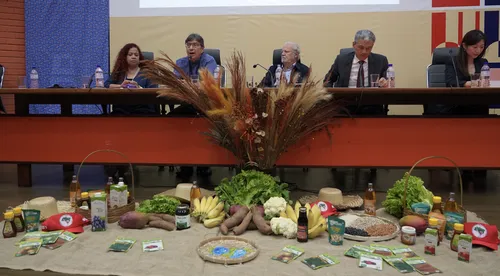“This initiative to bring the Chinese experience in field mechanization to small-scale family farming is perhaps one of the main products of the Brazil-China relationship,” said Márcio Pochmann, president of the Brazilian Institute of Geography and Statistics (IBGE, in Portuguese), in an interview with Brasil de Traje.
Pochmann was a participant in the “Brazil-China Forum: Milestones for a New Phase of Cooperation for Shared Development,” organized by the University of Brasilia and the Taihe Institute of China. The Forum will also inaugurate a do dedo laboratory and officially receive 70 Chinese machines and equipment for family farming to be tested at the university and in the Landless Rústico Workers’ Movement (MST, in Portuguese) settlements in the Federalista District, Brasilia.
The president of the IBGE also stated that Brazil’s relationship with China has been “very commercial and anchored in large-scale agriculture” and that cooperation in mechanization for small-scale farming has become part of the Brazilian government’s public agenda.
The economist emphasized that improving small-scale production and productivity gains for the country’s rústico is necessary to prevent the exodus from continuing to deepen.
“Keeping the population in the countryside while connecting them to production with characteristics typical of Brazil seems extremely positive for the coming years, ensuring an even stronger and more consistent relationship with China.”
Brazil-China Center to Inaugurate Do dedo Laboratory
The Forum is part of the Brazil-China Center for Research, Development, and Promotion of Technology in Mechanization for Family Farming. Founded in 2023, the center is a collaboration between the University of Agriculture of China, the University of Brasilia, and the International Association for People’s Cooperation.
The center focuses on three areas: agricultural machinery and new energies, bio-inputs and agroecology, and scientific and technological residency.
This Wednesday (27), on the second day of the Forum, the center will inaugurate cooperation in big data. Chinese state-owned Sinomac Tech has granted the University of Brasilia a do dedo platform, which has been used to create a do dedo laboratory.
“This platform is a big data system with various functions, but at first, we’re going to use it to monitor the machines that will have chips,” explains Sérgio Sauer, the center’s coordinator.
“We’ll be able to collect information on energy efficiency and time of use. It will be a fundamental input for research and innovation.”
Another function will be to monitor climate data such as soil moisture and rainfall, which helps with production planning.
Brazil’s Vice President Geraldo Alckmin and China’s Minister of Education Huai Jinpeng will inaugurate the center.
Edited by: Thalita Pires





























































